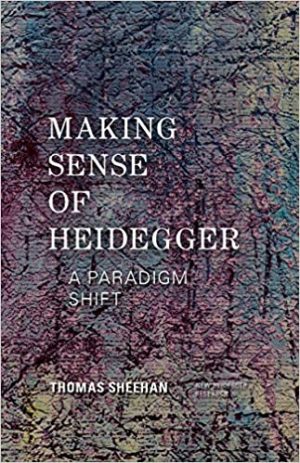Making Sense of Heidegger: A Paradigm Shift
About the Book
Making Sense of Heidegger presents a radically new reading of Heidegger’s notoriously difficult oeuvre. Clearly written and rigorously grounded in the whole of Heidegger’s writings, Thomas Sheehan’s latest book argues for the strict unity of Heidegger’s thought on the basis of three theses: that his work was phenomenological from beginning to the end; that “being” refers to the meaningful presence of things in the world of human concerns; and that what makes such intelligibility possible is the existential structure of human being as the thrown-open or appropriated “clearing.”
Sheehan offers a compelling alternative to the classical paradigm that has dominated Heidegger research over the last half-century, as well as a valuable retranslation of the key terms in Heidegger’s lexicon. This important book opens a new path in Heidegger research that will stimulate dialogue not only within Heidegger studies but also with philosophers outside the phenomenological tradition and scholars in theology, literary criticism, and existential psychiatry.
- Author: Thomas Sheehan
- Publisher: Dev Publishers & Distributors
- Edition: First
- Year: 2021
- Dimension: 14 x 21.5 cm
- No. of Pages: 370
- Weight: 400 gm
- ISBN: 9789387496606
- Binding: Softcover
- Territory: South Asia
- Price: ₹ 995
About the Author
Thomas Sheehan is professor of religious studies at Stanford University and professor emeritus of philosophy at Loyola University Chicago.
Reviews
This detailed, meticulous study addresses the confusion surrounding Heidegger scholarship. Cutting through all mysticism associated with the question of being, Sheehan uncovers the phenomenological bases of the ‘early’ and ‘late’ Heidegger, paying special attention to their Aristotelian heritage. Sheehan’s argument, at its core, is persuasive: he contends that the obsession with being has obscured the reality that the center of Heidegger’s entire project is the ‘clearing,’ wherein being takes place. Sheehan attaches a number of key Greek and Heideggerian terms to the idea of the clearing—for instance, the Logos that keeps it open or its becoming-one’s-own (Eigentum) in the event (Ereignis). The book is insightful not only as a contribution to Heidegger studies but also as a source of inroads into ancient Greek philosophy, informed by a new understanding of Heidegger’s thought. Summing Up: Essential. Graduate students, researchers, and faculty.
— CHOICE
[A]n important, if controversial, book … If Sheehan’s stature as a commentator on Heidegger were not already enough to recommend it, the book is written in a lucid and approachable style … Repeatedly, Sheehan draws on his wide knowledge of the Collected Works to make or illustrate important connections in Heidegger’s thinking across his whole corpus … Sheehan’s book is a significant achievement, and it will assist many, especially relatively new, readers of Heidegger.
— Notre Dame Philosophical Reviews
Table of Contents
Frequently Cited German Texts and their English Translations / Foreword / 1. Introduction: Getting to the Topic / Part I: Aristotelian Beginnings / 2. Being in Aristotle / 3. Heidegger Beyond Aristotle / Part II: The Early Heidegger / 4. Phenomenology and the Formulation of the Question / 5. Ex-sistence as Openness / 6. Becoming Our Openness / Part III: The Later Heidegger / 7. Transition: From Being and Time to the Hidden Clearing / 8. Appropriation and the Turn / 9. The History of Being / 10. Conclusion: Critical Reflections / Appendices / Bibliographies / Index


